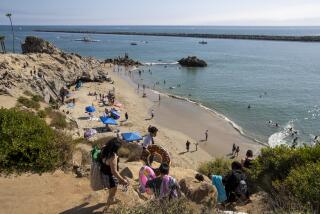Finders Keepers--Favorite Game of Treasure Hunters
- Share via
They are as much a part of the beach scene as the surfers and skaters and volleyball players. Yet to most beach-goers, the treasure hunters toting beeping, high-tech wands remain a mysterious lot.
Perhaps it’s their solitary nature, the odd-looking devices they carry, or just a curiosity about what they could be finding buried in the sand.
“People think we’re a bunch of scavengers,” said Bob Glick, 50, a longtime treasure hunter from Torrance who frequently searches for valuables in the sand at Hermosa Beach. “They don’t realize that this is my hobby and my sport. We don’t all need the money. Other people have baseball and football and tennis. I have detecting.”
Enthusiasts say that the activity is increasingly popular as manufacturers come up with more sophisticated machines, which cost up to $1,000 and can detect coins and jewelry many inches beneath the surface.
There are 15 treasure hunter clubs scattered throughout the state and more than 300 nationwide, but Southern California remains a hub for the hobby. One of the nation’s largest and oldest groups, the Prospector’s Club of Southern California, just celebrated its 25th anniversary.
Glick, vice president of the Downey-based club, approaches treasure hunting with the intensity of a surfer who plies the waves day after day at the crack of dawn. He has nine detectors and says that his finds have paid for every one of them.
The devices vary in their degree of sophistication, though all send electrical fields into the ground and measure the deflections.
Glick’s biggest find, one he shows off with a smile, is a diamond ring he plucked from the sand in Huntington Beach. Its value: about $1,000.
Treasure hunters embrace the “finders keepers” credo tightly--unabashedly searching for rings that dropped from fingers during romps in the surf, necklaces and other jewelry that disappeared into the sand and anything else left behind.
But club officials say they encourage hunters to try to track down original owners. When a successful match is made, the owner might be invited to club meetings to pick up the lost article.
But what keeps the hobby going is, as Walsh put it, the fact that “about 99% of the things you find have no identification and are impossible to return.”
Many treasure hunters volunteer their services to local law enforcement agencies, which sometimes use them to hunt for murder weapons.
“It’s real exciting,” said Charles Carfrae, a 64-year-old retiree from Downey who helped Los Angeles County sheriff’s deputies search for evidence after a murder in Arcadia last fall. “You’re helping the law enforcement agencies out, and there’s a real thrill in finding whatever it is the officers are looking for.”
Treasure hunters rave about the exercise they get and the camaraderie they develop in the clubs. But mostly what keeps them traversing the beaches and parks is, as Roger Gard, who sells detectors at Riviera Coins in Redondo Beach, puts it, the desire for easy money.
“To me there’s a thrill when you find something for nothing. Every time your machine beeps, it could be one of these,” he said, showing a gold pendant he found on the beach.
The pastime attracts a diverse following.
“We’ve got about everyone in our group--children, young college kids, right up to people who are retired,” said Ralph Crowther, president of the West Coast Prospectors and Treasure Hunters Assn. in Garden Grove. “The stereotype is a retired loner, but that’s not really the case.”
No matter the age, every hunter likes to gloat a bit about that especially satisfying find.
Crowther, 35, of Westminster, wears a gold ring that he found on the beach. He recalls fondly his biggest day, when he unearthed two diamond rings and a gold chain.
John Walsh, 44, who heads the 300-member Prospector’s Club of Southern California, said he hasn’t had any exceptional finds. But he notes proudly that his wife discovered a gold bracelet worth about $1,500 the first time she used a detector.
The beach is the most popular searching ground because of the constant stream of visitors, but the treasure hunters say any plot of land will do.
Glick, for instance, moved quickly through the grass at Torrance Park last Sunday waving his wand. When his detector blared, Glick pulled out a knife, sliced into the turf and dug underground. Was it a pricey ring, a gold nugget, a rare coin?
After a few seconds of probing, Glick uncovered a sprinkler head.
More to Read
Sign up for Essential California
The most important California stories and recommendations in your inbox every morning.
You may occasionally receive promotional content from the Los Angeles Times.













